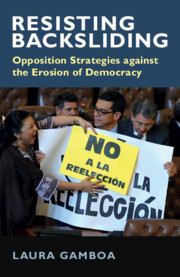Book contents
- Resisting Backsliding
- Resisting Backsliding
- Copyright page
- Dedication
- Contents
- Figures
- Tables
- Acknowledgments
- 1 Introduction
- 2 Opposition Strategies against the Erosion of Democracy
- 3 Electing Leaders with Hegemonic Aspirations
- 4 “Chávez Vete Ya”: The Erosion of Democracy in Venezuela
- 5 Preventing the Erosion of Democracy in Colombia
- 6 Opposition Strategies Elsewhere
- 7 Conclusion
- Book part
- References
- Index
5 - Preventing the Erosion of Democracy in Colombia
Published online by Cambridge University Press: 10 November 2022
- Resisting Backsliding
- Resisting Backsliding
- Copyright page
- Dedication
- Contents
- Figures
- Tables
- Acknowledgments
- 1 Introduction
- 2 Opposition Strategies against the Erosion of Democracy
- 3 Electing Leaders with Hegemonic Aspirations
- 4 “Chávez Vete Ya”: The Erosion of Democracy in Venezuela
- 5 Preventing the Erosion of Democracy in Colombia
- 6 Opposition Strategies Elsewhere
- 7 Conclusion
- Book part
- References
- Index
Summary
In the previous chapter, I showed how the Venezuelan opposition’s strategic choices helped Hugo Chávez erode democracy. In this chapter, I develop the other part of my argument by highlighting the role of the Colombian opposition in preventing democratic erosion. Between 2002 and 2010, Alvaro Uribe tried to erode democracy in Colombia. Like Hugo Chávez (1999–2013) in Venezuela, he introduced several reforms that sought to reduce the checks on the executive and extend his time in office beyond a second term. He was polarizing, and willing to push as far as he could to increase the powers of the presidency and stay in office beyond a second term. His government harassed opposition members, journalists, and members of the courts and worked in tandem with illegal armed actors to systemically undermine those who criticized the president. Contrary to Chávez, however, Uribe was not able to turn Colombia’s democracy into a competitive authoritarian regime. Despite his attempts to undermine the independence of the courts and the fairness of elections, Colombia’s constitutional order remained fairly strong, and Uribe had to step down after his second term.
Keywords
- Type
- Chapter
- Information
- Resisting BackslidingOpposition Strategies against the Erosion of Democracy, pp. 129 - 177Publisher: Cambridge University PressPrint publication year: 2022

